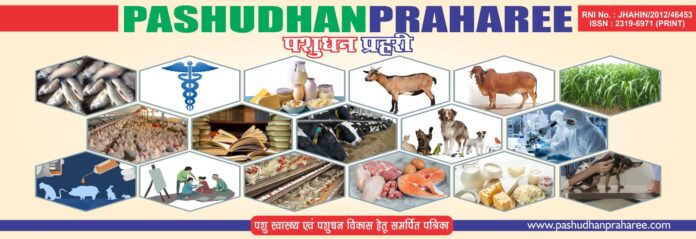Improved Ruminant Health: Probiotics and Gut Microbiota Cocktail
Anu Malik1, Parul Rana2
1Department of Veterinary Microbiology, Lala Lajpat Rai University of Veterinary and Animal Sciences, Hisar-125004, Haryana
2 Animal Nutrition Division, ICAR-National Dairy Research Institute, Karnal, Haryana
Probiotics are viable microorganisms that have been formulated in animal feed to provide the intended health benefits when administered in adequate amounts. The gut of ruminant animals is inhabited by diverse microbial communities including bacteria, protozoa, methanogens and fungi. The microbiota has important role in digestion and fermentation of feed by animal. The major rumen microbial groups include Prevotella, Streptococcus, Selenomonas, Lactobacillus, Megasphaera and some fiber-degrading bacteria like Fibrobacter, Ruminococcus, Butyrivibrio and Bacteroides. To ensure good animal health, a balance between the rumen microbial population is very essential. The variation in the rumen microbiota between animals has been reported due to differences in age, health status and environmental factors. The probiotics help to balance the gut microbiota, promote growth and build disease resistance making probiotic a potential alternative to antibiotics for improved animal health. There are different microbial species which are used as probiotics in animal feed include Bacillus, Enterococcus, Lactobacillus, Pediococcus, Streptococcus and yeast like Saccharomyces cerevisiae and Kluyveromyces. Live yeast (Saccharomyces cerevisiae) is the most common commercial probiotics used for ruminant feed formulation. For adult ruminants, use of yeast and fungal probiotics is more effective whereas in pre-ruminant calves, probiotic containing bacteria species have high efficacy. Probiotics have many beneficial effects on feed digestibility, celluloysis and synthesis of microbial protein and stabilization of lactate levels and rumen pH. Probiotics are known to enhance nutrient absorption. Consumption of probiotics in either form dry or live improve animal performance and maintain homeostasis through modulation of gut microbial community. The most way for the consumption of probiotics is the oral administration in the form of feed supplement that can compose of single or multi-strain microbial community.
Probiotics have remarkable growth promoting effects by increasing food intake, improved feed efficiency leading to average daily gain and overall total weight. In neonatal calves, the population of beneficial microbes such as Lactobacillus and Bifidobacteria are low in number, hence, they need supplementation of probiotics containing these microbes to enhance the growth and productivity of the animal. Also, supplementation of live yeast to feed of dairy cow will not only increase the milk yield but also improve the quality.
In the host organism, the mode action of probiotic at molecular level include stabilization of the gastrointestinal barrier function, regulation of microbial homeostasis in intestinal mucosa, immunomodulatory effects, expression of bacteriocins enzymatic activity inducing absorption and nutrition, inhibition of procarcinogenic enzymes, preventing apoptosis of intestinal cells and interference with the ability of pathogens to colonize and infect the mucosa. The mechanism of action one probiotic is different from the other and is mainly dependent on the strain of microorganism used. There are a number of mechanisms by probiotic promote disease resistance and reduce the severity of infection that include competition for receptors and nutrients, and/or the synthesis of organic acids and bacteriocins that create an environment unfavorable for pathogen development.
In ruminants, beneficial health effects of probiotics are related to their immunomodulatory activity in the gut by stimulating the secretion of immune modulators such as cytokines and IgA in intestinal mucosa. The probiotics have unique ability to modulate the immune system including both innate and adaptive immune responses. Various in vivo and in vitro studies were done to demonstrate the role of probiotic in promoting gut health via stimulation of the innate immune response. Different probiotic bacteria like Lactobacillus casei, Lactobacillus casei strain Shirota, Streptococcus thermophilus, Lactobacillus fermentum and yeast are known to elicit an immune response. Probiotic containing Lactobacillus casei when orally administered cause activation of innate immune response by stimulating the expression of innate immune receptor, TLR2. Similarly, the effects of probiotic containing Lactobacillus casei strain Shirota (LcS) were studied in mice that demonstrated that probiotics could enhance innate immune response by stimulating or inhibiting the production of TH1/TH2 cytokines such as IL4 and IL5. Probiotic (Lactobacillus rhamnosus GG) exert immunomodulatory effect and prevent cytokine-induced apoptosis in epithelial cells of intestine. Probiotic prevent apoptosis by inhibition of the p38/mitogen activated protein kinase activation by cytokines TNF, IL-1α, or IFN-γ or promoting the activation of anti-apoptotic molecule Akt/protein kinase B in intestinal colon cells of animal and humans. The effect of probiotics treatment on the inflammasome was also demonstrated by the researchers. The inflammasomes are defined as the receptors of innate immune system that regulate the activation of enzyme caspase-1 and induce inflammation in response to infectious agent. The inflammasome are present in intestinal epithelial cells and immune cells (macrophages and dendritic cells) and consists of cytosolic proteins such as NOD-like receptors, apoptosis-associated caspase-1. The inflammasomes play essential role in the development of chronic intestinal inflammation by activation and secretion of the inflammatory cytokines like and IL-18 and Interleukin (IL)-1β. Probiotic Lactobacillus rhamnosus GR-1 has tremendous effect on inhibition of E. coli induced inflammation in mammary epithelial cells. The impact of probiotics on activation of various pathways such as Toll-like receptor pathway, innate and adaptive immune response pathway, Wnt signaling pathway, homeostasis and gene expression associated with innate immunity is very well documented. In goats, oral administration of probiotic indicated that probiotics help in modulating the expression of genes associated with immunity and homeostasis and exhibit systemic effects in blood.
The use of probiotics could be good alternative for both dairy and beef cows to increase their growth and development at all stages. Therefore, probiotics are widely recognized as direct-fed microbes and have been used as functional foods. Though, probiotics play significant role in enhancing growth by the aim of improving gut health through modulating rumen fermentation pathways, various factors like dietary and management constraints markedly affect the structure and activities of gut microbial communities in livestock animals. The potential of probiotics in animal health and nutrition is best achieved when the dynamics of multiple factors work together in a well integrated fashion.
https://www.intechopen.com/chapters/58507
https://www.pashudhanpraharee.com/health-benefits-of-probiotics-in-livestock/



